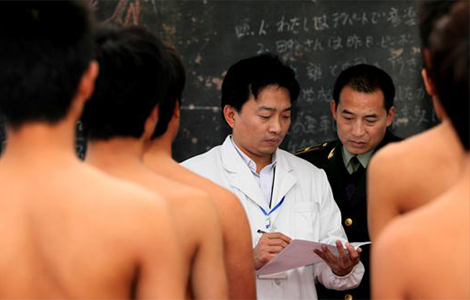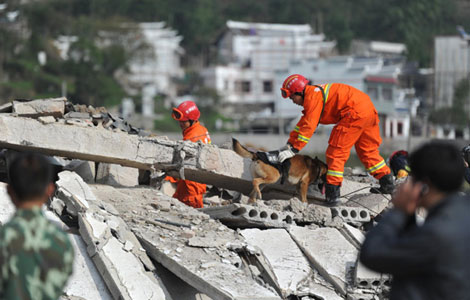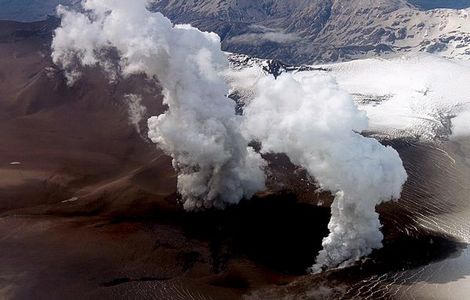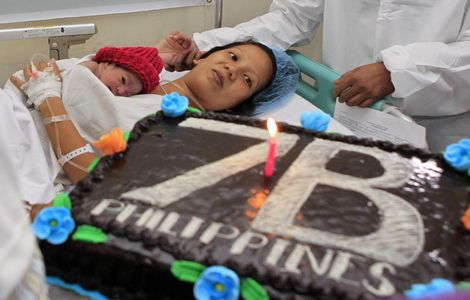China's PMI drops to 50.4% in Oct
Updated: 2011-11-01 17:40
(Xinhua)
|
|||||||||||
BEIJING - China's Purchasing Managers' Index (PMI) dropped to 50.4 percent in October after rising for two consecutive months, down 0.8 percentage points from September, the China Federation of Logistics and Purchasing (CFLP) said Tuesday.
The CFLP report said the decline indicated the country's economic growth might continue to slow in the fourth quarter.
It estimated the country's GDP will grow around 9.2 percent this year.
PMI is a gauge of manufacturing expansion. A reading below 50 indicates contraction from the previous month, while a reading above 50 indicates expansion. China's PMI had declined for four months in a row to a low of 50.7 percent in July before rebounding to 50.9 percent in August.
The manufacturing index from the logistics federation is based on a survey of purchasing managers in more than 820 companies in 20 industries.
In October, nine of the 20 industries, including medicine, electrical machinery equipment, clothing and fur, enjoyed a PMI of over 50 percent; while 11 other industries, including special equipment, petroleum processing, chemical fiber and rubber, were below 50 percent.
Zhang Liqun, a researcher with the Development Research Center of the State Council, or China's Cabinet, said the decline of October's PMI indicates a higher possibility of an economic slowdown in the near future.
The CFLP's figure is lower than the figure published by HSBC last Monday, which stood at 51.1 percent, or 1.2 percent higher than its figure for September. Experts say the difference between the two figures is that most businesses surveyed by the CFLP are state-owned enterprises while HBSC includes more small and mid-sized enterprises in its survey.
The CFLP's sub-index for purchase price fell by 10.4 percentage points from September to 46.2 percent, indicating that cost pressures on enterprises had eased, Zhang said, adding that it also showed more enterprises cut inventories as they anticipated further price declines.
The sub-index for new orders in October dropped slightly, declining 0.8 percentage points to 50.5 percent. The sub-index for new export orders slid by 2.3 percentage points to 48.6 percent, largely due to shrinking demand from the European Union and United States, according to analysts.
A report published Tuesday by China International Capital Corp., a major invesetment bank on the Chinese mainland, said the PMI was dragged down by drops of new orders and purchase prices. The trend showed China's manufacturing industries expanded at a slower pace, which might result in slower economic growth in the future.
It also said the Chinese government is not likely to loosen its tight monetary policy as the country's economic development is on the right track and the government has to rein in stubbornly high inflation.
China's consumer price index, a main gauge of inflation, eased slightly to 6.1 percent year-on-year in September from 6.2 percent in August, but far above the government's full-year target of 4 percent for 2011.
To mop up the excessive liquidity that helps fuel inflation, the government has implemented a prudent monetary policy. The central bank has raised benchmark interest rates three times this year and hiked the reserve requirement ratio for commercial banks six times.
China will fine tune its macro policy, making it "more targeted, flexible and forward-looking," and continue measures to control consumer prices, the State Council said Saturday.
The country's GDP expanded by 9.1 percent year-on-year in the third quarter of the year, the slowest pace since the third quarter of 2009, down from 9.5 percent in the second quarter of the year and 9.7 percent in the first quarter.
BNP Paribas economist Chen Xindong said the significant decline of China's PMI has raised concerns of a hard landing.
He estimated China's GDP growth rate in 2011 would stand above 9 percent. But it would be a great challenge for the government to sustain growth above 8 percent in 2012, he said.
However, China will not change its already tightened policy before the Central Economic Working Conference which will be held in December, he said.
Hot Topics
Libya conflict, Gaddafi, Oil spill, Palace Museum scandal, Inflation, Japan's new PM, Trapped miners, Mooncake tax, Weekly photos, Hurricane Irene
Editor's Picks

|

|
|

|

|

|







